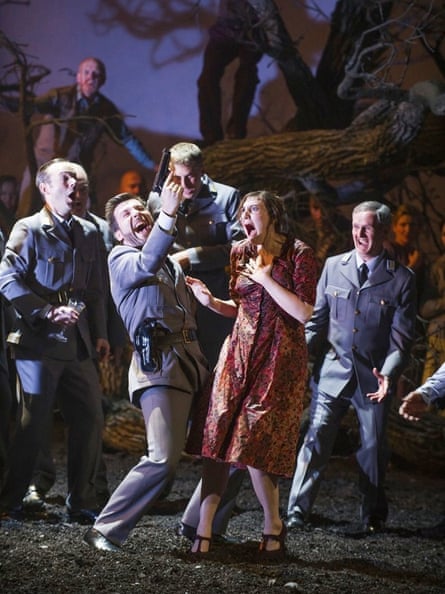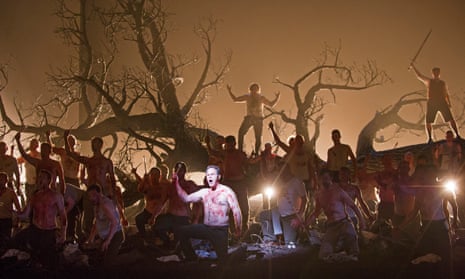Booing: the one petard guaranteed to hoist opera into the headlines. The Royal Opera’s new Guillaume Tell, perceptively conducted by Antonio Pappano, with a top cast led by Gerald Finley, John Osborn and Malin Byström, has achieved it as never before – and mid-performance at that. The noise on first night, which started as a lone shout and turned into a heckling barrage, was so solid I wondered if it had come from a prearranged, European-style claque. This grandest of red-plush auditoriums, for several minutes, became a loutish playground. How the performers kept going, steadfast and professional to the end, is anyone’s guess.
Despite attempts in opera circles to turn it into a talking point, booing is a dead issue. It’s a given, part of the freedom of expression valued by a civilised world, though hardly itself a civilised gesture. I don’t like it. Others do. The question here was why it happened at all. If a production is unpopular, the usual place to voice opinion is at the final curtain (it was, too), when the production team come on to take their bow. Here it was a nasty interruption. It happens, rarely, elsewhere. In Vienna the police had to be called mid-Trovatore when a row broke out about the singer. The cause at the ROH, as widely reported, was a dance interlude in which Austrian soldiers – dressed in generic Nazi-Fascist uniforms – first molested, then stripped, then gang-raped a Swiss villager.
Rossini’s 1829 work, requiring herculean singers, a super-strong tenor and vast forces, is itself far from pretty, despite a happy ending. It feels more like a Shakespearean romance in its mix of malevolence and magic, the bucolic mixed with the brutal. Generally the mood is bleak, with a touching father-son relationship and a love element that never rises above the formulaic, however well done. The agony of warfare is at its heart. This being French grand opera, there is ballet music too (there were some cuts. The work lasts well over four hours).

In the Soldier’s Dance – where the trouble arose – the music has a mood of careless menace: men coercing women to dance with them. The problem is it sounds relatively upbeat, as if suited to some folkloristic heel-and-toeing of an Austro-Swiss lederhosen variety. Perhaps this is what the audience expected. This is one of the enigmas of Rossini for a modern audience. Beneath the ready melodies and familiar stylistic tropes, there’s an underlying violence to the Italian composer’s last and most ambitious opera. Pappano and the orchestra, settling down after a dodgy and exposed string opening, brought out that menace. The score expresses it with restless shuddering from minor to major keys, excited choruses and genius orchestration that even Berlioz – a reluctant fan who wished he could impale every Rossini worshipper on a red-hot stake – admired.
The director Damiano Michieletto’s offence, if such it was, was to underline that cruelty: to parade the horrors we would prefer not to contemplate. In Paolo Fantin’s design, the story is updated, legitimately if vaguely – was it the 1950s or the 1990s? – to the Balkan wars. Figures in black rush in, pointing guns at a defenceless crowd of peasants who recoil. The Swiss men strip to their bare chests, lacerating themselves bloodily in the name of brotherhood and revenge. Nature, central to the story, is expressed by a stage full of realistic brown “earth” and a huge, toppled tree trunk of raw beauty. Lighting is stark: 25 fluorescent strips hang like upturned hurdles, with occasional bright, yellow backlights for dramatic effect and one further strip over the omnipresent desk belonging to Jemmy, Tell’s young son (the spirited Sofia Fomina).
In the offending scene, the woman – unnamed in the programme – showed her fear, shaking, whimpering, suffering every conceivable indignity. Yes, it was ugly. Perhaps if, male or female, you have not suffered violence, you might think it exaggerated. The phrase “gratuitous” has been used in many reports of the event. Why gratuitous, in this self-evident context? To show something is not to endorse it. We have seen worse, far worse, from the excrementally revolting to the priapic and the sexually louche, in opera and certainly in theatre and on film. (I found the scene in which children bathed, in underwear, all too vividly lit, more disturbing or, dare I say it, gratuitous.)
There were some good stage effects, as in the exploding apple that Tell “shoots” off his son’s head. Finley himself, ever present despite having only one aria of his own, was majestic and, as the famed archer of the story, had also turned himself into a good shot. Not everything works. The use of the comic strip to explain the William Tell story becomes clumsy. The projections, seen at the start then vanishing, add little. The strange figure with the red cape and feathered hat – the spirit of Switzerland – is tedious.
The Royal Opera House issued a statement late on Monday night apologising for causing offence. The instinct was natural and polite, but unnecessary (a “scenes of nudity and violence” health warning appears on the website). Anyone with an interest in bold, truthful theatre and wonderful music-making – reluctantly given necessarily short shrift here – should try it. No doubt many have cancelled their tickets in disgust. Find an air-conditioned cinema and see Sunday afternoon’s live relay.
This complex, marathon opera about liberty, performed with such gusto, gives us hope. In some respects at least, like William Tell himself, the Royal Opera’s production hit the mark.

Comments (…)
Sign in or create your Guardian account to join the discussion